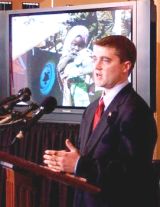US group begins 22-city tour calling for end to violence in Darfur
Feb 24, 2006 (PHILADELPHIA) — As he watched a village of 20,000 people in Darfur being looted and burned to the ground, Brian Steidle said the Sudanese general standing next to him stoutly denied that his men were taking part in the attack.
 The general maintained that stray bullets had set the village aflame, and although a few people may have been caught in the crossfire, they were unavoidable civilian casualties, said Steidle, a former Marine captain serving as a State Department observer in Darfur, Sudan.
The general maintained that stray bullets had set the village aflame, and although a few people may have been caught in the crossfire, they were unavoidable civilian casualties, said Steidle, a former Marine captain serving as a State Department observer in Darfur, Sudan.
Just then, a group of uniformed men drove by, stopped a short distance away, jumped out, and looted a hut before burning it. The general’s response to such incidents? “‘Anybody can get a uniform,'” Steidle said.
Steidle was in Philadelphia on Wednesday to open a 22-city tour and photo exhibit calling on the Bush administration and Congress to do more to end the violence in Darfur. The effort is to culminate with an April 30 rally in Washington, D.C.
The conflict began when mainly ethnic African rebels began an uprising in February 2003 against what they called decades of marginalization and neglect. Sudan’s Arab-dominated government and pro-government Arab tribal militia are accused of attacking ethnic African farmers in retaliation.
At least 180,000 people have died – many from hunger and disease – and about 2 million others are said to have fled their homes. The United States and several other nations have said genocide has occurred in Darfur. The government denies backing the militias, called Janjaweed.
Steidle, who served from Sept. 2004 to February 2005 as the U.S. representative to the African Union’s peacekeeping mission, said he saw helicopters firing on villages, found mutilated bodies, and interviewed people who told of rapes and fleeing villagers shot by militias.
The observers had no mandate to stop the violence, something Steidle said went against his Marine training.
“It was very difficult for me to sit there and watch and grit my teeth and do nothing,” said Steidle. The team filed scores of reports to the African Union, but all but a handful disappeared, he said.
The United States has been calling for more effort to halt the violence, and NATO is considering boosting training, transport and planning assistance to the African Union peacekeeping force of 7,000. NATO deployment, however, would need a United Nations request, with backing from Russia, China and the African Union – which prefers an African solution to the conflict.
Steidle, however, said he believes the United States could persuade the African Union to go along with a joint UN or NATO mission with its own forces monitoring and foreign forces acting as peacekeepers.
The Save Darfur Coalition is calling on people to send postcards – an electronic version of which is available on the campaign’s Web site – calling on Bush to use his office to support a stronger multinational force to protect the people of Darfur.
“As a people, I think we can say, ‘This is important to us and they have to listen,'” said Steidle, who retired from the Marines in 2003. He is also working on a book about his experience and a documentary film with interview of survivors.
(AP/ST)
